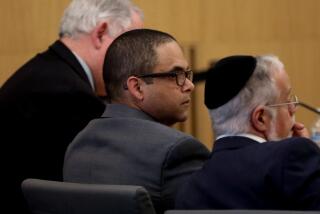Jury selection begins for George Zimmerman in Trayvon Martin case
- Share via
The trial of George Zimmerman began Monday with the laborious process of picking a jury that will decide the fate of the neighborhood watch volunteer accused of second-degree murder in the shooting death of Trayvon Martin, an unarmed African American teenager, during a confrontation last year in a gated community in Sanford, Fla.
After a day of fits and starts, the defense and prosecution were able to question only four possible jurors in the first pool of 100 people who filled out questionnaires. The first round of questioning dealt primarily with the impact of pretrial publicity in a case that sparked local and national protests.
After the questioning, the lawyers met in front of Circuit Judge Debra S. Nelson, where their discussions were private. But in comments in open court, Nelson said three of the four people questioned were asked to return Tuesday morning, along with 17 other jurors who were not questioned. That would imply that one of those questioned was already excused.
PHOTOS: The Trayvon Martin case in pictures
The four possible jurors — whose names, like everyone’s in the jury pool, are being withheld — agreed they could hand down a fair verdict based just on what they heard in the courtroom.
“Everybody needs a fair trial,” said one woman, described as an assistant in a nursing home who attends church and has several teenage boys. “At the end of the day, you have to listen to both sides.”
Wearing a dark suit and silver tie, Zimmerman, 29, sat stoically through the long day’s proceedings. He appeared heavier than he had during his initial appearance more than a year ago.
WHO’S WHO: Key players in the Zimmerman trial
Earlier in the day, Nelson dismissed the latest defense request to delay the proceedings after lead defense attorney Mark O’Mara argued that more time was needed to prepare. The defense has repeatedly argued that the state has been slow in turning over required materials, making preparation more difficult. Prosecutors have opposed any extension.
Zimmerman has apologized for killing Martin on Feb. 26, 2012, during a confrontation. A member of a neighborhood watch group at the time, Zimmerman has insisted he acted in self-defense after Martin, 17, attacked him.
Authorities originally accepted the self-defense claim, in part because of Zimmerman’s visible injuries. But protests in Florida, and then nationally, led to the appointment of a special prosecutor who charged Zimmerman on April 11 of last year. If convicted, Zimmerman could face life in prison.
FULL COVERAGE: The Trayvon Martin case
Potential jurors will fill out questionnaires and will be brought in to be questioned in the presence of all parties who can seek to strike some of them. Once there is a pool of about 21, they will be questioned by the defense and prosecution as part of the usual voir dire process that allows each side to try to shape the jury to its benefit. Each side has 10 peremptory challenges.
The jury will be composed of six people. Four alternates will also be selected.
Martin’s father, Tracy Martin, told reporters that he was relieved that the trial was finally starting.
“We seek a fair and impartial trial,” Martin said on Monday. “We ask that the community continue to stay peaceful as we place our faith in the justice system.”
Robert Zimmerman Jr., George’s brother, told reporters that “as a family we’re very confident in the outcome of the case.”
“It’s my suggestion that the state doesn’t have a case,” he said at a news conference at the Seminole County courthouse in Sanford. “I believe it’s an improper charge altogether. I wish they would just withdraw it.”
He said prosecutors had been swayed by public protests. “You don’t charge in this country simply to assuage the concerns of the masses. You charge when there is probable cause.”
Although Sanford residents in general say racism is not prevalent in their city of some 55,000 about 20 miles from Orlando, views of the case and upcoming trial seem to skew along racial lines, with blacks saying that racial profiling propelled Zimmerman to shoot Martin and whites saying race should not come into play. Zimmerman identifies himself as Latino.
“This trial is 50% racial and 50% criminal. That’s why the whole country is watching — to see what will happen with the racial profiling part of it,” said Francis Oliver, curator at the Goldsboro Westside Historical Museum, which documents the once-independent black city of Goldsboro, now part of Sanford. “Every city that has the same problem of racial profiling is waiting to see how this case goes because it affects all of them.”
A white woman strolling along Sanford’s Lake Monroe who gave her name as Eileen, but did not want to give a surname, said racism should not have come into the case. “I think both parties were wrong,” she said, adding that Zimmerman should not have pursued Martin, but that Martin should not have been out walking after dark.
ALSO:
Supreme Court orders new hearing for California raisin farmers
Three years later, BP oil cleanup ends in some Gulf Coast states
Detroit woman testifies she saw officer shoot her granddaughter
Twitter: @tinasusman
More to Read
Sign up for Essential California
The most important California stories and recommendations in your inbox every morning.
You may occasionally receive promotional content from the Los Angeles Times.












